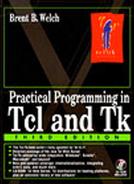The Widget Instance Command
For each instance of a widget, a new command is created that operates on that widget. This is called the widget instance command. Its name is the same as the Tk pathname of the widget. In the clock example, all that is done on instances is to query and change their attributes. Most of the work is done by Tk_ConfigureWidget and ClockConfigure, which are shown in the next section. The ClockInstanceCmd command procedure is shown in the next example:
Example 46-5 The ClockInstanceCmd command procedure.
Example 46-6 shows the ClockInstanceObjCmd procedure. It uses the Tk_GetIndexFromObj routine to map the first argument to an index, which is then used in a switch statement. It uses the Tk_GetOptionValue and Tk_GetOptionInfo procedures to parse the widget configuration options.
Example 46-6 The ClockInstanceObjCmd command procedure.
..................Content has been hidden....................
You can't read the all page of ebook, please click here login for view all page.
